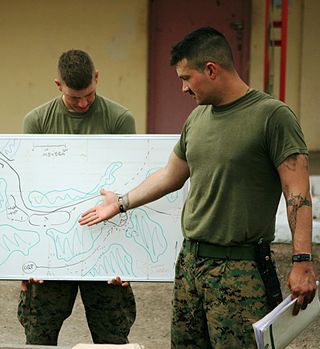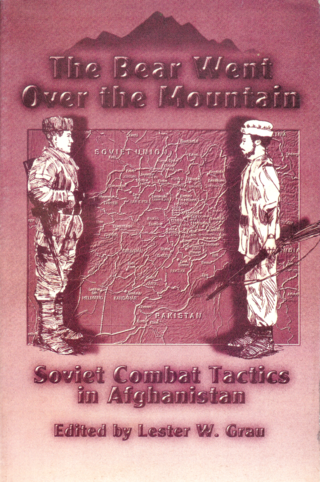Related Research Articles

The FBI Academy is the Federal Bureau of Investigation's law enforcement training and research center near the town of Quantico in Prince William County, Virginia. Operated by the bureau's Training Division, it was first opened for use on May 7, 1972, on 385 acres (156 ha) of woodland, which is not available for public tours. The academy was opened for the purpose of training the new agents after FBI agents were granted the power to arrest, and to possess a firearm, in 1933. As the newly armed agents needed somewhere to train, the Marine Corps granted them access to their firing ranges in Quantico, Virginia. After outgrowing the Marine Corps firing ranges the FBI was granted permission to build their own firing range and classroom on the base. Over time they added new sections such as a whole new wing, kitchen, and basement. But with the rapid growth it still was not enough for their needs.

The German General Staff, originally the Prussian General Staff and officially the Great General Staff, was a full-time body at the head of the Prussian Army and later, the German Army, responsible for the continuous study of all aspects of war, and for drawing up and reviewing plans for mobilization or campaign. It existed unofficially from 1806, and was formally established by law in 1814, the first general staff in existence. It was distinguished by the formal selection of its officers by intelligence and proven merit rather than patronage or wealth, and by the exhaustive and rigorously structured training which its staff officers undertook.

The Basic School (TBS) is where all newly commissioned and appointed United States Marine Corps officers are taught the basics of being an "Officer of Marines." The Basic School is located in Stafford County, Virginia to the south-west of the Marine Corps Base Quantico complex. Each year, over 1,700 new officers are trained, representing such commissioning sources as the U.S. Naval Academy, Navy ROTC, Officer Candidates School, and Marine Corps Limited Duty Officer (LDO) and Warrant Officer, U.S. Merchant Marine Academy accession programs.

A military exercise, training exercise, or war game is the employment of military resources in training for military operations. Military exercises are conducted to explore the effects of warfare or test tactics and strategies without actual combat. They also ensure the combat readiness of garrisoned or deployable forces prior to deployment from a home base.
Marine Doom is a 1996 modification of the first-person shooter Doom II for the United States Marine Corps, which was later made available for download to the public.
Hogan's Alley is a tactical training facility operated by the FBI Training Academy near Quantico, Virginia. Spread over more than 10 acres (4 ha), Hogan's Alley was opened in 1987 and was designed to provide a realistic urban setting for training agents of the FBI, DEA, and other local, state, federal and international law enforcement agents. It is also occasionally used as an urban combat training venue for lieutenants at the United States Marine Corps' The Basic School, which is located nearby. The term "Hogan's Alley" is also used generically to refer to any shooting range devoted to tactical training.
Mission-type tactics is a method of command and delegation where the military commander gives subordinate leaders a clearly-defined objective, high-level details such as a timeframe, and the forces needed to accomplish that objective. The subordinate leaders are given the planning initiative and freedom of execution: they decide on the methods to achieve the objective independently. This allows a high degree of flexibility at the operational and tactical levels of command, which allows for faster decision-making on the ground and frees the higher leadership from managing the tactical details to concentrate on the strategic picture. This may be contrasted with "Befehlstaktik" or command-type tactics.
The case method is a teaching approach that uses decision-forcing cases to put students in the role of people who were faced with difficult decisions at some point in the past. It developed during the course of the twentieth-century from its origins in the casebook method of teaching law pioneered by Harvard legal scholar Christopher C. Langdell. In sharp contrast to many other teaching methods, the case method requires that instructors refrain from providing their own opinions about the decisions in question. Rather, the chief task of instructors who use the case method is asking students to devise, describe, and defend solutions to the problems presented by each case.

The United States Marine Corps Officer Candidates School (OCS) is a training regiment designed to screen and evaluate potential Marine Corps Officers. Those who successfully complete the period of instruction are commissioned as Second Lieutenants in the United States Marines. Unlike the other United States military services, the majority of Marine Corps officers complete OCS to earn a commission; the exceptions are midshipmen from the United States Naval Academy, limited duty officers and warrant officers, and inter-service transfers. It is located at Marine Corps Base Quantico.

The Small Wars Manual is a United States Marine Corps manual on tactics and strategies for engaging in certain types of military operations.

Fleet Command, previously labelled as Jane's Fleet Command, is a real-time tactics naval warfare simulation computer game released in May 1999. It was developed by Sonalysts Inc. and published by Electronic Arts (EA). The game licensed parts of Jane's Information Group's military information database, which was used as an in-game "Jane's Library", reference material that the player could refer to while in-game. Jane's also licensed to EA the "Jane's" name and the "Jane's Combat Simulations" logo, and the game was marketed under the "Jane's" name, much like the previous "Jane's Fighters Anthology", also published by Electronic Arts.

Military simulations, also known informally as war games, are simulations in which theories of warfare can be tested and refined without the need for actual hostilities. Military simulations are seen as a useful way to develop tactical, strategical and doctrinal solutions, but critics argue that the conclusions drawn from such models are inherently flawed, due to the approximate nature of the models used. Many professional analysts object to the term wargames as this is generally taken to be referring to the civilian hobby, thus the preference for the term simulation.
Intelligence dissemination management is a maxim of intelligence arguing that intelligence agencies advise policymakers instead of shaping policy. Due to the necessity of quick decision-making in periods of crisis, intelligence analysts may suggest possible actions, including a prediction of the consequences of each decision. Intelligence consumers and providers still struggle with the balance of what drives information flow. Dissemination is the part of the intelligence cycle that delivers products to consumers, and intelligence dissemination management refers to the process that encompasses organizing the dissemination of the finished intelligence.

The term staff ride describes three different types of military exercises and examinations, usually conducted on a particular future battlefield and/or area of operation for the purpose of preliminary reconnaissance, terrain study and tactical preparation. As the Classic Staff Ride, the Leavenworth Staff Ride and the Decision-Forcing Staff Ride have been subjected to modern military scholarly work, the idea and practice of battlefield examination and exploitation has been documented throughout history. As early as 500 years BC, the Chinese general Sun Tzu emphasized the rigorous study of the terrain. Notable military commanders, such as Hannibal, Napoleon or Frederick the Great have regularly studied the terrain and exploited to its full advantage.

A tactical decision game is a decision game that puts students in the role of the commander of a tactical unit who is faced with a challenging problem. While most tactical decision games depict problems faced by the commanders of military units, a growing number deal with the situations of types dealt with by police and firefighting organizations.

The Joint Deployable Analysis Team (JDAT) is part of the J6 Directorate of the Joint Chiefs of Staff.

Robert Osborne Bare was a decorated officer of the United States Marine Corps, who reached the rank of lieutenant general. He is most noted for his work as chief of staff of 1st Marine Division during World War II and later as Assistant Division Commander of the same unit during Korean War. Bare later retired as commanding general of the 1st Marine Division.

A wargame, generally, is a type of strategy game which realistically simulates warfare. A professional wargame, specifically, is a wargame that is used by military organizations to train officers in tactical and strategic decision-making, to test new tactics and strategies, or to predict trends in future conflicts. This is in contrast to recreational wargames, which are designed for fun and competition.

The School of Advanced Warfighting (SAW) in the United States Marine Corps is an Advanced Intermediate Level School (A-ILS) that produces officers qualified to fill high-impact service and joint planning billets. The curriculum features numerous case studies, multiple planning exercises, extensive staff rides, and a consideration of future war. Graduates earn the secondary Military Occupational Specialty (MOS) 0505 Marine Air Ground Task Force (MAGTF) planner and a Masters Degree in Operational Studies. SAW was designed to develop field grade officers for the Marine Corps most difficult operational and planning challenges.

The Bear Went Over the Mountain: Soviet Combat Tactics in Afghanistan is a 1996 non-fiction book translated and edited by American military scholar and author Lester W. Grau. The book is translated from a study initially published by the Frunze Military Academy in 1991 titled "Combat Actions of Soviet Forces in the Republic of Afghanistan" and subtitled "A Thematic Collection of Tactical Examples." Grau received the original Russian language text from the Department of the History of the Military Art at the Frunze academy. With their permission he translated, included commentary, and published his results as this book.
References
- ↑ Gudmundsson, Bruce I. Decision Forcing Cases (PDF). Quantico: Marine Corps University. Archived from the original (PDF) on 2019-04-21. Retrieved 2019-04-21.
- Anderson, Scott (2003), Design and Delivery of Tactical Decision Games and Sand Table Exercises (PDF), National Interagency Fire Center, Boise, Idaho, archived from the original (PDF) on 2017-01-24, retrieved 2014-10-07.
- Gudmundsson, Bruce Ivar (2014), Decision-Forcing Cases (PDF), Marine Corps University, Quantico, Virginia.
- Lausch, Chrichton, and Bayerl (2009), Tactical Decision Games: Developing Scenario-Based Training for Decision-Making in Distributed Teams (PDF), British Computer Society.
{{citation}}: CS1 maint: multiple names: authors list (link) - Machiavelli, Niccolò (1908), The Prince, (W.K. Marriott, translator), J.M. Dent, London, England, archived from the original on 2017-01-13, retrieved 2014-10-07.
- von Moltke, Hellmuth (1894), Moltke's Tactical Problems, (Karl von Donat, translator), W.H. Allen, London, England.
- Schmitt, John F. (1994), Mastering Tactics: A Tactical Decision Games Workbook, Marine Corps Association, Quantico, Virginia.